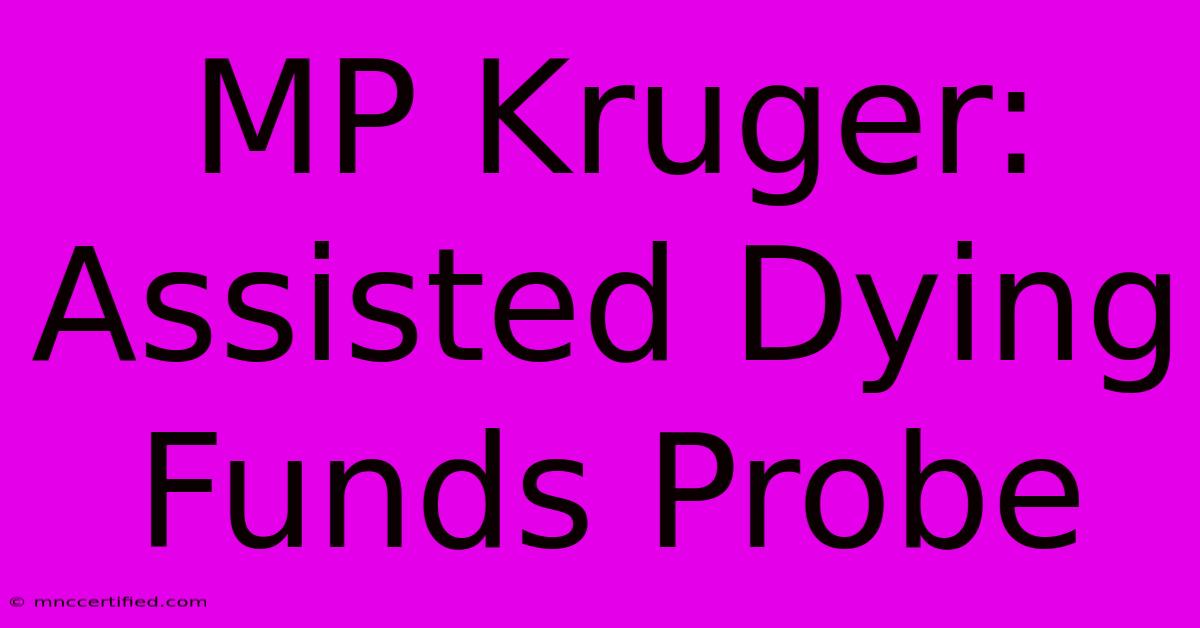MP Kruger: Assisted Dying Funds Probe

Table of Contents
MP Kruger: Assisted Dying Funds Probe – A Deep Dive into the Controversy
The recent probe into the funding surrounding MP Kruger's stance on assisted dying has ignited a firestorm of debate and speculation. This article delves into the controversy, examining the allegations, the political ramifications, and the ethical considerations at play. We’ll analyze the key players, the evidence presented, and the potential consequences of this unfolding saga.
The Allegations: What's at the Heart of the Controversy?
The core of the controversy centers around allegations that MP Kruger received undisclosed funding from organizations advocating for or against assisted dying. The exact nature and amount of these alleged donations remain unclear, fueling public speculation and calls for transparency. Accusations range from direct financial contributions to indirect support through affiliated organizations, creating a complex web of potential influence. Key questions remain unanswered: Was the funding disclosed as required by law? Did the funding influence MP Kruger's position on assisted dying legislation? And crucially, what measures are in place to ensure the integrity of the political process?
Examining the Source of the Allegations
The allegations initially surfaced in [mention source – e.g., a leaked document, media report, whistleblower]. This source claims to possess evidence linking specific organizations to MP Kruger's campaign and political activities. The credibility of this source is crucial, and its claims must be rigorously investigated to avoid fueling misinformation and baseless accusations.
Political Ramifications: Impact on Public Trust and Legislation
This controversy has profound political ramifications. It threatens to erode public trust in the political process, raising concerns about potential corruption and undue influence. The timing of the allegations, especially if they occurred close to crucial votes on assisted dying legislation, further exacerbates the situation. The outcome of the probe will significantly impact public perception of MP Kruger and their party.
Potential Consequences for Assisted Dying Legislation
The probe could potentially delay or even derail the progress of assisted dying legislation. Depending on the findings, the legitimacy of the votes and the subsequent laws could be called into question. This uncertainty could lead to further division and prolong the debate surrounding this sensitive and emotive issue.
Ethical Considerations: Transparency and Accountability in Politics
The situation underscores the critical need for transparency and accountability in politics. Stronger regulations regarding the disclosure of political donations are crucial to prevent situations where undisclosed funding could potentially influence policy decisions. Ethical considerations extend beyond the legal framework: The public has a right to know who is funding political campaigns and what influence these donations may have.
The Role of the Media and Public Scrutiny
The media plays a vital role in investigating such controversies and holding politicians accountable. Public scrutiny and active participation in democratic processes are equally important in ensuring the integrity of the political system. By demanding transparency and engaging in informed discussion, citizens can help prevent situations like this from undermining public trust.
Conclusion: A Call for Transparency and Thorough Investigation
The MP Kruger assisted dying funds probe highlights the complexities and challenges of ensuring ethical conduct in politics. A thorough and impartial investigation is essential to uncover the truth and restore public trust. This case serves as a stark reminder of the importance of transparency, accountability, and the need for robust regulations to safeguard the integrity of the democratic process. The outcome of the investigation will not only impact MP Kruger's career but also shape the future of assisted dying legislation and the overall political landscape.
Keywords: MP Kruger, assisted dying, funds probe, political controversy, transparency, accountability, ethical considerations, political donations, legislation, public trust, investigation, media scrutiny.

Thank you for visiting our website wich cover about MP Kruger: Assisted Dying Funds Probe. We hope the information provided has been useful to you. Feel free to contact us if you have any questions or need further assistance. See you next time and dont miss to bookmark.
Featured Posts
-
Investing 401k In Real Estate
Nov 29, 2024
-
Allegri Spurs Rumours Premier League Interest
Nov 29, 2024
-
Thanksgiving Nfl Team Patch Unveiled
Nov 29, 2024
-
Business Insurance Wichita Ks
Nov 29, 2024
-
Life Changers Investments Llc
Nov 29, 2024